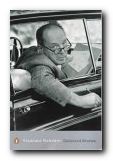a critical examination of Nabokov’s collected stories
Further twists in the arrangement and manipulation of narrative are made in ‘Terra Incognita’ (1931) and Nabokov also invents an imaginary world and fragments of its language in a manner which prefigures the Zembla and Zoorlandia of his later novels Pale Fire and Ada.
 The narrator, Valliere, is an explorer on an entomological expedition in Badonia, a tropical country of forests and swamps. He is accompanied by his friend Gregson and Cook, who is a coward. In its overt subject the story is rather like a parody of Conrad’s ‘An Outpost of Progress’. They are deserted by their native bearers; Valliere becomes dangerously ill with fever; and Gregson and Cook quarrel then kill each other, leaving Valliere to die alone.
The narrator, Valliere, is an explorer on an entomological expedition in Badonia, a tropical country of forests and swamps. He is accompanied by his friend Gregson and Cook, who is a coward. In its overt subject the story is rather like a parody of Conrad’s ‘An Outpost of Progress’. They are deserted by their native bearers; Valliere becomes dangerously ill with fever; and Gregson and Cook quarrel then kill each other, leaving Valliere to die alone.
The atmospheric detail is somewhat predictable, almost as if Nabokov is signalling a self-conscious recognition that his subject harks back to Edwardian models of boys’ adventure stories – but the detail is rendered in a prose style which is rich with emphatic rhythm, alliteration, and exotic vocabulary:
‘The branches of porphyroferous trees intertwined with those of the Black Leafed Limia to form a tunnel, penetrated here and there by a ray of hazy light” (RB, p.120).
We begin to suspect that the contrivance of both plot and detail might be deliberate when we encounter the first hints that Valliere may not be offering us an altogether reliable narrative.
To begin with he tells us that he is very ill with a fever that distorts his perception: ‘I was tormented by strange hallucinations’ (p.121). This is Nabokov’s first twist in the game of unreliable narrator – the man who admits that he may have things wrong. Many of Valliere’s subsequent observations are offered in a manner which supports this supposition: ‘Gregson and Cook seemed to grow transparent’ (p.123).
Then Nabokov adds a second twist. We are led to suspect from hints he drops that Valliere might be imagining the whole story in a European sickbed. He sees window curtains, an armchair, a crystal tumbler and teaspoon, and the rocks on which he is abandoned seem to him ‘as white and soft as a bed’ (p.125). The reader feels reassured that he need not take all this too seriously, or to feel that Valliere is genuinely in danger.
At this point Nabokov poses two difficult problems, for both himself and the reader. Valliere announces that his fever is fatal: he is about to die in a few moments. Problem number one: how do first person narratives reach us if their author is at the point of death? This is solved with a traditional device from the world of fiction. Valliere begins to reach for a notebook, so we presume that the narrative in our possession is what he manages to write down. But problem number two is more dramatically shocking:
‘in these final minutes everything grew completely lucid: I realised that all that was taking place around me was not the trick of an inflamed imagination … I realised that the obtrusive room was fictitious’ (p.127).
So he is dying in the tropics after all. The hints of a European sickroom were Nabokovian false clues laid to tease and deceive the reader. We are kept in a state of almost metaphysical suspense until the very final sentence: ‘I absolutely had to make a note of something; but alas, [the notebook] slipped out of my hand. I groped all along the blanket, but it was no longer there’ (p.128).
There has been no mention of a blanket in the exotic world of Badonia, but such an objects fits perfectly well into the sickroom: hence we conclude that Valliere’s sudden fit of lucidity was another of his illusions and that he is in the sickroom after all. The narrative therefore was recorded in the notebook at some later date, after he had recovered.
We might feel a little cheated by this resolution, but Nabokov, working within the limits of what is logically permissible in fictional narratives, has reasonably managed to sustain the illusion of what Andrew Field calls ‘the simultaneous cofunctioning of two distinct worlds’ (LA, p.76). The atmosphere and detail of the narrative may indeed belong to the boys’ adventure story, but as an example of the subtly unstable narrative it is another step closer to the more daring experiments Nabokov was to make in the next few years.
© Roy Johnson 2005
![]() Vladimir Nabokov: The Collected Stories – Amazon UK
Vladimir Nabokov: The Collected Stories – Amazon UK
![]() Vladimir Nabokov: The Collected Stories – Amazon US
Vladimir Nabokov: The Collected Stories – Amazon US
Vladimir Nabokov web links
Vladimir Nabokov greatest works
Vladimir Nabokov criticism
Vladimir Nabokov life and works
